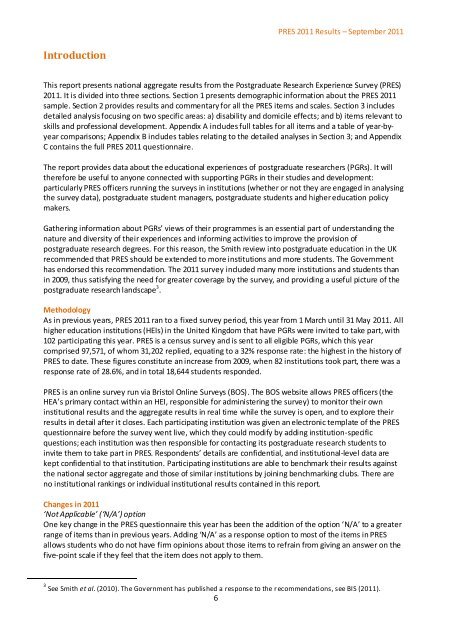Postgraduate Research Experience Survey (PRES) 2011 - Higher ...
Postgraduate Research Experience Survey (PRES) 2011 - Higher ...
Postgraduate Research Experience Survey (PRES) 2011 - Higher ...
Create successful ePaper yourself
Turn your PDF publications into a flip-book with our unique Google optimized e-Paper software.
<strong>PRES</strong> <strong>2011</strong> Results – September <strong>2011</strong><br />
Introduction<br />
This report presents national aggregate results from the <strong>Postgraduate</strong> <strong>Research</strong> <strong>Experience</strong> <strong>Survey</strong> (<strong>PRES</strong>)<br />
<strong>2011</strong>. It is divided into three sections. Section 1 presents demographic information about the <strong>PRES</strong> <strong>2011</strong><br />
sample. Section 2 provides results and commentary for all the <strong>PRES</strong> items and scales. Section 3 includes<br />
detailed analysis focusing on two specific areas: a) disability and domicile effects; and b) items relevant to<br />
skills and professional development. Appendix A includes full tables for all items and a table of year-byyear<br />
comparisons; Appendix B includes tables relating to the detailed analyses in Section 3; and Appendix<br />
C contains the full <strong>PRES</strong> <strong>2011</strong> questionnaire.<br />
The report provides data about the educational experiences of postgraduate researchers (PGRs). It will<br />
therefore be useful to anyone connected with supporting PGRs in their studies and development:<br />
particularly <strong>PRES</strong> officers running the surveys in institutions (whether or not they are engaged in analysing<br />
the survey data), postgraduate student managers, postgraduate students and higher education policy<br />
makers.<br />
Gathering information about PGRs’ views of their programmes is an essential part of understanding the<br />
nature and diversity of their experiences and informing activities to improve the provision of<br />
postgraduate research degrees. For this reason, the Smith review into postgraduate education in the UK<br />
recommended that <strong>PRES</strong> should be extended to more institutions and more students. The Government<br />
has endorsed this recommendation. The <strong>2011</strong> survey included many more institutions and students than<br />
in 2009, thus satisfying the need for greater coverage by the survey, and providing a useful picture of the<br />
postgraduate research landscape 3 .<br />
Methodology<br />
As in previous years, <strong>PRES</strong> <strong>2011</strong> ran to a fixed survey period, this year from 1 March until 31 May <strong>2011</strong>. All<br />
higher education institutions (HEIs) in the United Kingdom that have PGRs were invited to take part, with<br />
102 participating this year. <strong>PRES</strong> is a census survey and is sent to all eligible PGRs, which this year<br />
comprised 97,571, of whom 31,202 replied, equating to a 32% response rate: the highest in the history of<br />
<strong>PRES</strong> to date. These figures constitute an increase from 2009, when 82 institutions took part, there was a<br />
response rate of 28.6%, and in total 18,644 students responded.<br />
<strong>PRES</strong> is an online survey run via Bristol Online <strong>Survey</strong>s (BOS). The BOS website allows <strong>PRES</strong> officers (the<br />
HEA’s primary contact within an HEI, responsible for administering the survey) to monitor their own<br />
institutional results and the aggregate results in real time while the survey is open, and to explore their<br />
results in detail after it closes. Each participating institution was given an electronic template of the <strong>PRES</strong><br />
questionnaire before the survey went live, which they could modify by adding institution-specific<br />
questions; each institution was then responsible for contacting its postgraduate research students to<br />
invite them to take part in <strong>PRES</strong>. Respondents’ details are confidential, and institutional-level data are<br />
kept confidential to that institution. Participating institutions are able to benchmark their results against<br />
the national sector aggregate and those of similar institutions by joining benchmarking clubs. There are<br />
no institutional rankings or individual institutional results contained in this report.<br />
Changes in <strong>2011</strong><br />
‘Not Applicable’ (‘N/A’) option<br />
One key change in the <strong>PRES</strong> questionnaire this year has been the addition of the option ‘N/A’ to a greater<br />
range of items than in previous years. Adding ‘N/A’ as a response option to most of the items in <strong>PRES</strong><br />
allows students who do not have firm opinions about those items to refrain from giving an answer on the<br />
five-point scale if they feel that the item does not apply to them.<br />
3 See Smith et al. (2010). The Government has published a response to the recommendations, see BIS (<strong>2011</strong>).<br />
6
















